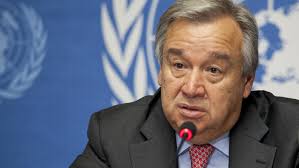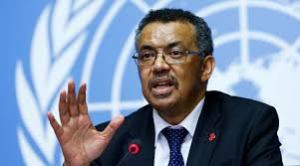In Time of Pandemic Praise for the UN
TRANSCEND MEMBERS, 6 Apr 2020
Richard Falk | Global Justice in the 21st Century – TRANSCEND Media Service
 The UN Secretary General Promotes Global and Human interests.
The UN Secretary General Promotes Global and Human interests.
 The Director General of WHO Guides us.
The Director General of WHO Guides us.
Points of Departure
3 Apr 2020 – In recent years, the UN has seemed weak, almost irrelevant to many of the most disturbing global developments. It failed to stop genocide in Rwanda (1994) and Myanmar (2017-19), it has failed over several decades to end Israeli apartheid that is victimizing the Palestinian people and find peace for Israelis and Palestinians, it authorized a limited humanitarian protective use of force in Libya that immediately turned into an unauthorized and unlawful regime-changing intervention by NATO in Libya that brought ongoing chaos to the country, it has unacceptably stayed on the sidelines throughout Syrian and Yemeni ordeals as strife, massive civilian displacement, intervention, along with repeated crimes against humanity, were making a mockery of international humanitarian law, and it watched while disastrous fires burned out of control in the Amazon rainforest and Australia.
The UN is not an autonomous organization, and cannot be faulted for its failures, but its members can. The UN is essentially a political club run for the almost exclusive benefit of its member sovereign states, themselves largely controlled by its most powerful members. This control is exercised by way of funding, voting procedures, and informal modes of exerting influence within the Organization. The UN Charter provides a constitutional framework, which if it could engender compliance, would produce major, desirable, and fundamental global reforms, but the Charter says one thing, while international relations continue to operate according to the logic of militarism and geopolitics. As well, there are some internal tensions written into the Charter, which contains unworkable procedures for taking account of changes in international life, including amending the text. This has given the UN a partially frozen image responsive to the realities of 1945, but increasing out of sync with the world of today.
During the Cold War the inability of the UN to fulfill its promises with respect to peace and security were largely explained by reference to paralyzing encounters between ‘the free world’ and ‘the Soviet bloc.’ Yet, after the collapse of the Soviet Union when a new consensus emerged among Permanent Members of the Security (P-5) not much changed. Many governments showed that they wanted to uphold sovereignty rights rather than be held internationally accountable according to standards set by human rights treaties or by reference to international law. The United States, in particular, insisted on freedom of geopolitical maneuver for itself and its allies, while pushing hard for accountability when dealing with adversaries. It became clear that a weak UN was consistent with the political priorities of almost all of its members, some sovereignty-oriented, a few geopolitically-oriented. At the same multilateralism, based on mutual benefit and global bargains gave the UN a useful role in facilitating global cooperation for the first fifty or so years of it existence, yet surprisingly not in the last 25 years up to the present.
These structural explanations of UN weakness were reinforced by cyclical political changes in the governing style of many important states. The rise of ultra-nationalist reactions to the failures of neoliberal globalization as post-Cold War and post-industrial capitalism revealed its predatory characteristics if not somewhat tamed by countervailing forces accentuated the state-centric framework of international relations that was implicitly hostile to any sources of authority external to the national political order. The kind of political leaders that were elected in dominant countries (U.S., UK, Brazil, India, Japan) exemplified this inward autocratic turn that was particularly opposed to global governance that accorded prominence to the United Nations. It reinforced autocratic trends in middle power democracies (Philippines, Turkey), as well as the embrace of ultra-nationalism by important non-democratic autocracies (Russia, China, Saudi Arabia, Egypt).
The UN Speaks for the Peoples of the World
Against such a background, it might come as a surprise that the UN has played an important role since a crisis awareness unfolded as the COVID-19 challenge became global in scope and severe in depth. The first sign of UN significance was the extent to which governments, the media, and the public looked to and depended upon the World Health Organization (WHO) for information and guidance. Although the WHO was not one of the political organs whose work is generally regarded as indicative of the success or failure of the UN as a world organization, it was ‘a specialized agency’ within the UN System that long had gathered and disseminated information about health issues, and performing vital roles for countries that lacked sophisticated national health services of their own.
What the COVID-19 experience made clear was the importance of information to virtually every person and governmental body on the planet, and the degree to which the WHO and its Director General were quickly established as a valued source of reliable and trustworthy information. The geopolitical rivalry between the U.S. and China, as well as a variety of conspiracy theories explaining the outbreak of the disease cloud our understanding of origins and nature of threat, and what to do about it. This sense of confusion is heightened by lots of huckstering claims being made on behalf of exotic products that purport to strengthen immune systems and resistance to the disease, as well as calls to adopt untested preventive tactics and unconventional treatments. Given such considerations, establishing public trust and informational reliability become paramount goals, and WHO and Tedros Adhanan Grebreyerus, its Director General, have risen to the occasion, gaining media credibility and worldwide respect.
The dramatic highpoint of WHO came on March 11th when this expert UN body officially declared that the Coronavirus disease causing a worldwide health crisis was a pandemic. Such a declaration was quickly adopted by governments, media, and publics around the world, escalating preventive efforts in the form of lockdowns, travel restrictions, self-isolation, and social distancing overnight. It was a tribute to the quasi-authoritative status on such matters that WHO achieved along with the recognition that no other comparable source of guidance or pronouncement existed in the world. What is more, the WHO determination came after a persuasive show of reluctance to alarm the world prematurely by invoking the incendiary word ‘pandemic.’ In retrospect, it is obvious that pandemic is to health what genocide is to human rights. Where the language of pandemic is appropriate, it is crucial to have such conditions authoritatively identified, and where conditions do not warrant arousing global alarm it is as important to refrain from inflammatory language. Also, relevant is that despite the diversity of perspectives in the world, no serious effort has been made to challenge the WHO’s pronouncement. This is an impressive defiance of the ultra-nationalist mood that has previously dominated policymaking in the last five or so years, and exhibited distrust and disrespect for the UN and its pronouncements.
A second reason that the UN has achieved an enhanced reputation during this period is that the voice of António Guterres, the UN Secretary General, has seemed to articulate proposals that transcend statist and geopolitical orientations, and take their cue from ideas about the wellbeing of humanity, as well as in support of global interests, rather than put manifest nationalistic approaches involving exclusions, walls, and militarized boundaries. So far national and geopolitical leaders have responded to the Guterres call for the suspension of economic sanctions or even more radically, for ‘a global ceasefire’ with silence. Geopolitical actors, especially the U.S. are unwlling to acknowledge the inappropriateness of maintaining sanctions and coercive diplomacy during the pandemic, but neither are such governments likely to criticize the Secretary General openly for speaking out, although arguably his reselection for a second term may have been placed in doubt. In this sense, Guterres has given renewed credibility to the idea that the head of the UN is the world’s leading moral authority figure, a position previously probably most widely accorded to Pope Francis, but with less global outreach as speaking on behalf of the Catholic Church.
What this pandemic has already made clear to many persons is the need for a normative global discourse when it comes to health, which as suggested here, means trust, reliability, and comprehensive and useful information, as well as moral leadership that is not being provided by either states or geopolitical actors. The UN stepped forward to fill this discursive gap in a manner that has already had an impact. Of course, whether a health crisis of pandemic proportions is a stepping stone to normative globalism on other issues can be hoped for, but is far from assured. In fact, there are reasons to be skeptical. Despite the magnitude of the pandemic crisis, the most geopolitical tinged organ of the UN, the Security Council, has not even spoken out to date, much less responsibly performed its cardinal role as guardian of the peace and security of the peoples of the world. If global governance reflected rationality and humane values, rather than hegemonic and nationalistic values, this Coronavirus authoritative discourse at the UN should be directly transferable to climate change, the overall ecological agenda, and fashioning a humane response to migrations flows. Such UN learning and adaptations outside the health domain seems doubtful at this point as doing so would amount to mounting successful challenges to the geopolitical discourse that has controlled the UN since its inception.
If for Health, Why Not Climate Change, Biodiversity, Migration?
It had been previously evident that global cooperation was needed to address climate change and related ecological issues, and the UN did provide auspices for the Paris Climate Change Agreement in 2015, which has lagged subsequently, being a casualty of ultra-nationalist dismissal of global policy priorities and Trump’s withdrawal of the United States from further participation in the agreement, the leading per capita source of carbon emissions. There is no doubt that the pandemic has demonstrated the pragmatic benefits of a cooperative approach, as opposed to reliance on competitive national interest approaches to addressing problems causing serious harm and threats of truly global scope. The same benefits of cooperation evident in relation to a pandemic exist with respect to climate change and biodiversity, and to some extent more dramatically, as the dangers of such scientifically established trends are more knowable and menacing, while becoming less reversible than are singular events such as an outbreak of the COVID-19 disease.
Despite this, health is more amenable to a global approach than climate change or biodiversity even though the latter concerns possess a global reach that is beyond reasonable doubt. Perhaps the most salient difference relates to time/space characteristics. The pandemic is here and now, with people dying the world over on a daily basis digitally portrayed in real time, while the impacts of climate change and biodiversity, although certainly having present impacts, are perceived as being largely situated in the future or in mostly geographically remote and limited locales, thus remaining abstract and without mobilizing capability to aarouse the general public, and for this reason tend to become controversial, scorned and rejected by those whose material interests or religious outlook might suffer from timely adjustment. Perhaps, even more explanatory than reference to the interests at stake, is the related issue of the psychological relevance of concreteness. A Coronavirus infection threatens with lethal immediacy the body of every individual inhabiting the planet, and by now most persons know someone who has suffered from the disease. COVID-19 is not a matter of a dispersed threat such as arises from global warming or the seemingly remote threat that arises from the destruction of rainforests or a lessening of biodiversity. Finally, the authority of the UN with respect to health does not encroach upon traditional spheres of territorial sovereignty as is the case with peace and security and with the regulation of private and public sector activity that does harm to the environment. Even the Paris Agreement did not attempt to regulate military causes of carbon dissemination or impose remedies for non-compliance with national pledges to reduce carbon emissions.
Concluding Observations
In conclusion, there is much to learn from the pandemic even at this early stage, and possibly, as time passes a more impressive learning curve will become evident in reaction to the spread and prolonged character of this health crisis. There is little doubt that many governments will learn the lessons of the last war, and be better prepared with respect to the availability of adequate medical facilities to address future large-scale epidemics, including pandemics. And maybe, if civil society activism is alert to the opportunity, some spillover effects will occur leading to a renewed readiness of governments to cooperate for the sake of promoting global interests and protecting global public goods, and in the process reinvigorating the UN as a necessary site of authority, information, cooperation, and institutional legitimacy. It is also quite possible that the UN will be quickly remarginalized as private sector and governmental energies are focused on economy recovery in forms that benefit big constellations of capital and finance.
One additional cautionary observation seems appropriate. What the WHO and the SG of the UN have so far done during the health crisis, while worthy of headlines, posed no direct challenge to sovereignty or geopolitics. It is discursive with no behavioral or direct policy claims, although investing the crisis with the stature of a pandemic did have distinct, and perhaps profound effects, on national responses and public awareness. The grounds for low expectations is strengthened by the failure of the Security Council to step forward with initiatives or even commentary. The Security Council’s discursive silence is rather startling under the circumstances, failing even to encourage recourse to global mechanisms fostering regional and global cooperative responses. The fact that this most statist dimension of the UN had nothing to offer in the face of a global emergency of unprecedented globality and severity offer a guide to what the UN can and cannot do. Such a failure is less that of the UN as an institutional matrix than it is of the nature of geopolitically managed global governance, which has used the Security Council as a subsidiary instrument of control. Furthermore, health has an apolitical essence that is associated with the widespread belief in the sacredness of life, and thus offers resistance to the kind of cost/benefit thinking that is much weaker when the concerns are about economic activity or the sovereignty and security priorities of militarized states.
__________________________________________
 Richard Falk is a member of the TRANSCEND Network, an international relations scholar, professor emeritus of international law at Princeton University, Distinguished Research Fellow, Orfalea Center of Global Studies, UCSB, author, co-author or editor of 60 books, and a speaker and activist on world affairs. In 2008, the United Nations Human Rights Council (UNHRC) appointed Falk to two three-year terms as a United Nations Special Rapporteur on “the situation of human rights in the Palestinian territories occupied since 1967.” Since 2002 he has lived in Santa Barbara, California, and associated with the local campus of the University of California, and for several years chaired the Board of the Nuclear Age Peace Foundation. His most recent book is On Nuclear Weapons, Denuclearization, Demilitarization, and Disarmament (2019).
Richard Falk is a member of the TRANSCEND Network, an international relations scholar, professor emeritus of international law at Princeton University, Distinguished Research Fellow, Orfalea Center of Global Studies, UCSB, author, co-author or editor of 60 books, and a speaker and activist on world affairs. In 2008, the United Nations Human Rights Council (UNHRC) appointed Falk to two three-year terms as a United Nations Special Rapporteur on “the situation of human rights in the Palestinian territories occupied since 1967.” Since 2002 he has lived in Santa Barbara, California, and associated with the local campus of the University of California, and for several years chaired the Board of the Nuclear Age Peace Foundation. His most recent book is On Nuclear Weapons, Denuclearization, Demilitarization, and Disarmament (2019).
Go to Original – richardfalk.wordpress.com
Tags: Antonio Guterres, COVID-19, Coronavirus, United Nations
DISCLAIMER: The statements, views and opinions expressed in pieces republished here are solely those of the authors and do not necessarily represent those of TMS. In accordance with title 17 U.S.C. section 107, this material is distributed without profit to those who have expressed a prior interest in receiving the included information for research and educational purposes. TMS has no affiliation whatsoever with the originator of this article nor is TMS endorsed or sponsored by the originator. “GO TO ORIGINAL” links are provided as a convenience to our readers and allow for verification of authenticity. However, as originating pages are often updated by their originating host sites, the versions posted may not match the versions our readers view when clicking the “GO TO ORIGINAL” links. This site contains copyrighted material the use of which has not always been specifically authorized by the copyright owner. We are making such material available in our efforts to advance understanding of environmental, political, human rights, economic, democracy, scientific, and social justice issues, etc. We believe this constitutes a ‘fair use’ of any such copyrighted material as provided for in section 107 of the US Copyright Law. In accordance with Title 17 U.S.C. Section 107, the material on this site is distributed without profit to those who have expressed a prior interest in receiving the included information for research and educational purposes. For more information go to: http://www.law.cornell.edu/uscode/17/107.shtml. If you wish to use copyrighted material from this site for purposes of your own that go beyond ‘fair use’, you must obtain permission from the copyright owner.